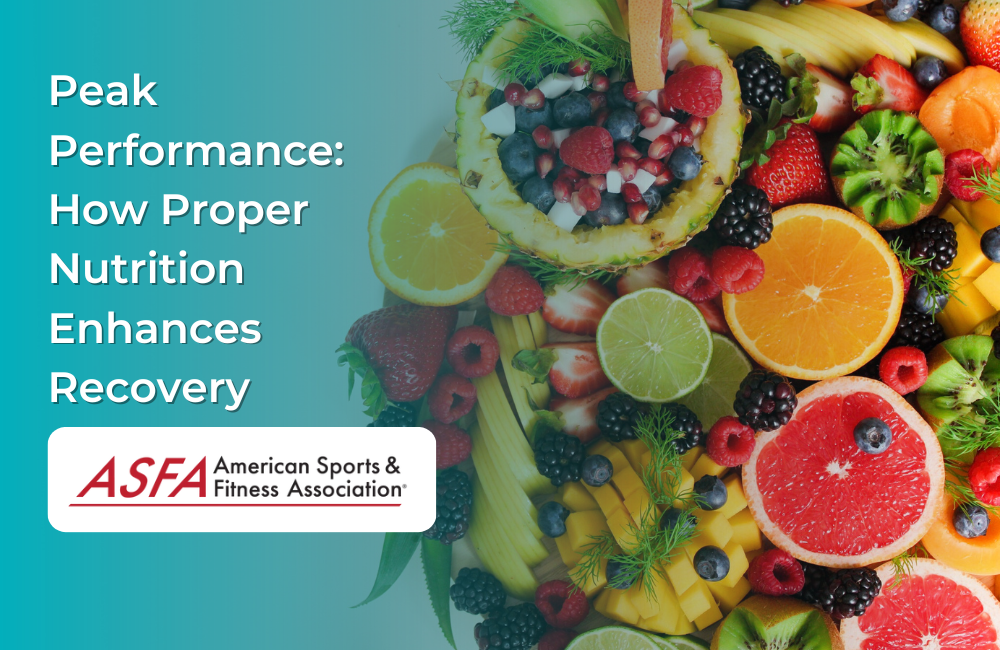Achieving peak performance as an athlete isn't just about what you do during training and competition; it's also about how you recover. Proper recovery is essential for repairing muscles, replenishing energy stores, and preparing your body for the next challenge. Nutrition plays a pivotal role in this process. In this blog, we will explore how proper nutrition enhances recovery, from the importance of macronutrients to key nutrients and timing strategies that optimize the post-exercise recovery window.
The Role of Nutrition in Recovery
Recovery nutrition focuses on replenishing what was lost during exercise and promoting the body's healing and adaptation processes. Key objectives of recovery nutrition include:
- Muscle Repair: To repair and rebuild damaged muscle fibers.
- Glycogen Replenishment: To refill depleted glycogen stores, the body's primary energy source during exercise.
- Hydration: To replace fluids and electrolytes lost through sweat.
- Reducing Inflammation: To minimize exercise-induced inflammation and oxidative stress.
- Overall Recovery: To support the body's general recovery processes, including immune function.
Macronutrients for Recovery
1. Carbohydrates:
Carbohydrates are crucial for replenishing glycogen stores, especially after prolonged or intense exercise. Consuming carbohydrates within the first 30 minutes to 2 hours post-exercise is essential to maximize glycogen synthesis.
Examples: Whole grains, starchy vegetables, fruits, and legumes.
2. Protein:
Proteins are essential for muscle repair and growth. Consuming protein post-exercise aids in muscle protein synthesis and reduces muscle damage.
Examples: Lean meats, poultry, fish, eggs, dairy products, plant-based sources (e.g., beans, tofu).
3. Healthy Fats:
Healthy fats, particularly those rich in omega-3 fatty acids, can help reduce inflammation and support overall recovery.
Examples: Fatty fish (e.g., salmon, mackerel), nuts, seeds, avocado, olive oil.
Key Nutrients for Recovery
In addition to macronutrients, several key nutrients play vital roles in recovery:
1. Electrolytes (Sodium, Potassium, Magnesium):
Electrolytes help maintain fluid balance, muscle function, and nerve signaling. Replenishing electrolytes post-exercise is crucial, especially if you've sweated heavily.
Examples: Bananas (potassium), nuts and seeds (magnesium), salted foods (sodium).
2. Antioxidants (Vitamins C and E, Selenium):
Antioxidants help reduce exercise-induced oxidative stress and inflammation. They support the body's natural recovery processes.
Examples: Citrus fruits, nuts, seeds, spinach (vitamin C), nuts, seeds, vegetable oils (vitamin E), seafood (selenium).
3. Vitamin D:
Vitamin D is essential for bone health and immune function. Exposure to sunlight and vitamin D-rich foods can aid recovery.
Examples: Fatty fish (e.g., salmon, mackerel), fortified dairy products, sunlight.
4. Calcium:
Calcium is vital for muscle function and bone health. Adequate calcium intake supports recovery and injury prevention.
Examples: Dairy products, fortified plant-based milks, leafy greens (e.g., kale, spinach).
Timing Strategies for Optimal Recovery
Recovery nutrition is most effective when timed correctly. Here are some timing strategies to consider:
1. The 30-Minute Window:
- Consume a combination of carbohydrates and protein within 30 minutes post-exercise to jumpstart recovery. This timing is critical for glycogen synthesis and muscle repair.
2. Regular Meals and Snacks:
- Eat regular meals and snacks throughout the day to provide your body with a steady supply of nutrients for recovery.
3. Hydration:
- Rehydrate with fluids containing electrolytes to replace what was lost through sweat. Aim for a balanced fluid intake throughout the day.
4. Bedtime Snack:
- A small bedtime snack that includes protein can support muscle repair during sleep.
Customizing Your Recovery Nutrition Plan
Every athlete's recovery needs are unique, depending on factors like the type and intensity of exercise, training goals, and individual dietary preferences. To customize your recovery nutrition plan:
- Consult with a sports dietitian or nutritionist for personalized guidance.
- Experiment with different post-exercise meals and snacks to see what works best for you.
- Pay attention to how your body responds to various foods and adjust your recovery nutrition accordingly.
Conclusion
Proper nutrition is a powerful tool in enhancing recovery and ultimately achieving peak performance as an athlete. By prioritizing macronutrients, key nutrients, and timing strategies for recovery, you can optimize your body's ability to repair, refuel, and prepare for the next challenge. Remember that recovery nutrition is not one-size-fits-all; it should be tailored to your individual needs and goals.





